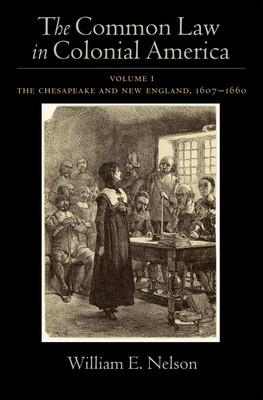
- We will send in 10–14 business days.
- Author: William E Nelson
- Publisher: Oxford University Press, USA
- ISBN-10: 0195327284
- ISBN-13: 9780195327281
- Format: 16.3 x 23.4 x 2.3 cm, kieti viršeliai
- Language: English
- SAVE -10% with code: EXTRA
Reviews
Description
William E. Nelson here proposes a new beginning in the study of colonial legal history. Examining all archival legal material for the period 1607-1776 and synthesizing existing scholarship in a four-volume series, The Common Law in Colonial America shows how the legal systems of Britain's thirteen North American colonies--initially established in response to divergent political, economic, and religious initiatives--slowly converged into a common American legal order that differed substantially from English common law.
Drawing on groundbreaking and overwhelmingly in-depth research into local court records and statutes, the first volume explores how the law of the Chesapeake colonies--Virginia and Maryland--diverged sharply from the New England colonies--Massachusetts Bay, Connecticut, New Haven, Plymouth, and Rhode Island--and traces the roots of these dissimilarities from their initial settlement until approximately 1660. Nelson pointedly examines the disparate motives of the legal systems in the respective colonies as they dealt with religion, price and labor regulations, crimes, public morals, the status of women, and the enforcement of contractual obligations. He reveals how Virginians' zeal for profit led to a harsh legal framework that efficiently squeezed payment out of debtors and labor out of servants; whereas the laws of Massachusetts were primarily concerned with the preservation of local autonomy and the moral values of family-centered farming communities. The law in the other New Englandcolonies, Nelson argues, gravitated towards the Massachusetts model, while Maryland's law, gravitated toward that of Virginia. Comprehensive, authoritative, and extensively researched, The Common Law in Colonial America, Volume 1: The Chesapeake and New England, 1607-1660 is the definitive resource on the beginnings of the common law and its evolution during this vibrant era in America's history. William E. Nelson here proposes a new beginning in the study of colonial legal history.
EXTRA 10 % discount with code: EXTRA
The promotion ends in 21d.23:07:01
The discount code is valid when purchasing from 10 €. Discounts do not stack.
- Author: William E Nelson
- Publisher: Oxford University Press, USA
- ISBN-10: 0195327284
- ISBN-13: 9780195327281
- Format: 16.3 x 23.4 x 2.3 cm, kieti viršeliai
- Language: English English
William E. Nelson here proposes a new beginning in the study of colonial legal history. Examining all archival legal material for the period 1607-1776 and synthesizing existing scholarship in a four-volume series, The Common Law in Colonial America shows how the legal systems of Britain's thirteen North American colonies--initially established in response to divergent political, economic, and religious initiatives--slowly converged into a common American legal order that differed substantially from English common law.
Drawing on groundbreaking and overwhelmingly in-depth research into local court records and statutes, the first volume explores how the law of the Chesapeake colonies--Virginia and Maryland--diverged sharply from the New England colonies--Massachusetts Bay, Connecticut, New Haven, Plymouth, and Rhode Island--and traces the roots of these dissimilarities from their initial settlement until approximately 1660. Nelson pointedly examines the disparate motives of the legal systems in the respective colonies as they dealt with religion, price and labor regulations, crimes, public morals, the status of women, and the enforcement of contractual obligations. He reveals how Virginians' zeal for profit led to a harsh legal framework that efficiently squeezed payment out of debtors and labor out of servants; whereas the laws of Massachusetts were primarily concerned with the preservation of local autonomy and the moral values of family-centered farming communities. The law in the other New Englandcolonies, Nelson argues, gravitated towards the Massachusetts model, while Maryland's law, gravitated toward that of Virginia. Comprehensive, authoritative, and extensively researched, The Common Law in Colonial America, Volume 1: The Chesapeake and New England, 1607-1660 is the definitive resource on the beginnings of the common law and its evolution during this vibrant era in America's history. William E. Nelson here proposes a new beginning in the study of colonial legal history.


Reviews